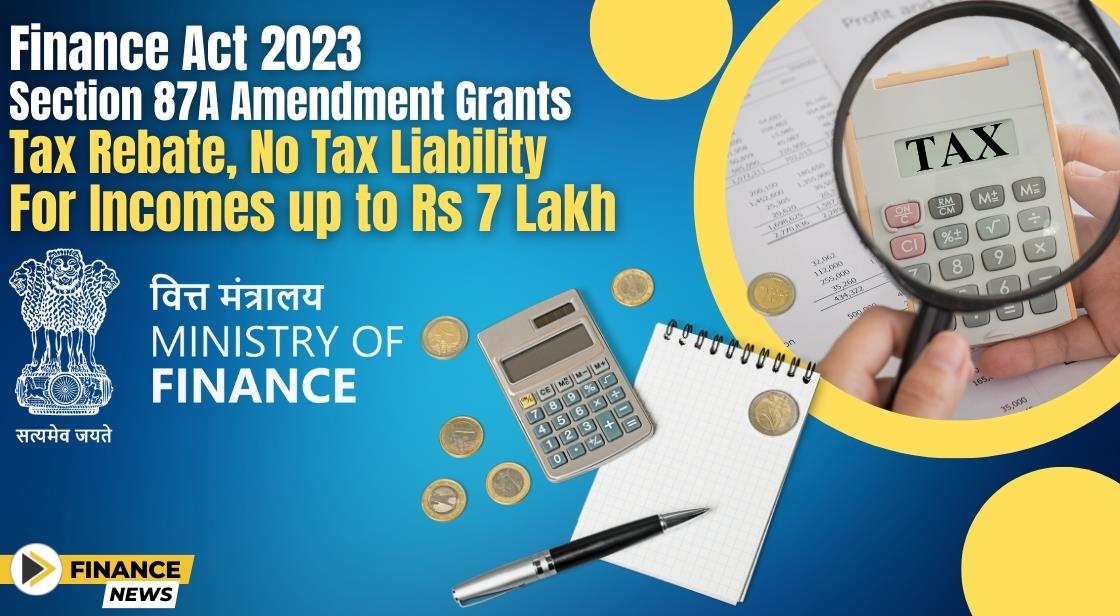Finance Act 2023: Section 87A Amendment Grants Tax Rebate, No Tax Liability for Incomes up to Rs 7 Lakh

News Synopsis
Good news for Indian taxpayers! The Finance Act 2023 brings significant changes to personal income tax benefits, offering major relief to a wider segment of the population.
No Tax Burden for Many! Income Up to Rs. 7 Lakh Exempt in the New Regime
As per the latest amendment to Section 87A of the Income-tax Act, 1961, individuals with income up to Rs. 7 lakh in the new tax regime will now enjoy a complete tax rebate, effectively making them exempt from paying any income tax. This translates to Rs. 2 lakh extra disposable income for taxpayers falling within this bracket, a considerable boost to their purchasing power.
Fulfilled Promise, Enhanced Relief:
This move fulfills a promise made by the Ministry of Finance, as highlighted in their Twitter post: "Benefits in Personal Income Tax! Vide Finance Act, 2023, Section 87A of the Income-tax Act, 1961 has been amended to allow rebate to tax resulting in no tax liability to persons having income up to Rs. 7 lakh. (1/5) #Promises Delivered".
Prioritizing Tax Relief:
The Central Board of Direct Taxes (CBDT) has been actively delivering on budget promises for the fiscal year 2023-24, with a strong focus on providing relief in personal income tax. The Finance Act of 2023 implements crucial changes like the revised Section 87A, directly impacting individual tax liabilities.
From Rs. 5 Lakh to Rs. 7 Lakh: Expanding the Benefit Net
Previously, the exemption limit for both the old and new tax regimes stood at Rs. 5 lakh. The Finance Act 2023 raises this limit to Rs. 7 lakh specifically for the new tax regime, significantly increasing the number of individuals who can benefit from this tax-free zone.
Positive Impacts on Individuals and Economy:
This change has several positive implications:
-
Increased Disposable Income: With no tax burden for individuals earning up to Rs. 7 lakh in the new regime, their disposable income rises by Rs. 2 lakh, leading to potentially higher spending and boosting overall economic activity.
-
Wider Taxpayer Relief: The increased limit expands the scope of individuals exempt from income tax, providing relief to a larger segment of the population.
-
Simplified Tax Regime: This move further simplifies the new tax regime by offering a clear income threshold for complete tax exemption.
Conclusion: A Step Towards a Brighter Financial Future
The Finance Act 2023's amendment to Section 87A marks a significant step towards creating a more inclusive and financially empowered India. By offering complete tax relief to individuals earning up to Rs. 7 lakh in the new regime, the government has delivered on its promise of providing tangible relief to a wider segment of taxpayers.
This move not only increases disposable income for millions of individuals, but also simplifies the tax landscape and potentially stimulates economic growth through increased spending.
While further reforms and improvements in the tax system remain necessary, the Finance Act 2023's focus on personal income tax relief and simplifying the new regime sets a positive precedent.
As the Indian economy navigates the post-pandemic landscape, prioritizing measures like this that empower individuals and boost their purchasing power will be crucial to building a more equitable and resilient future for all.
This tax exemption is not just a fiscal benefit; it's a statement of intent, a signal that the government recognizes the challenges faced by ordinary citizens and is actively working to alleviate them.
Let's hope that this is just the beginning of a continued focus on making the Indian tax system more just, efficient, and supportive of its citizens' financial well-being.
You May Like









